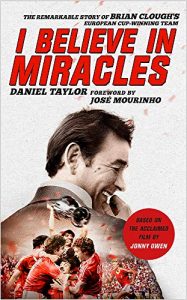Top Ten Football Books: Stuart Kane
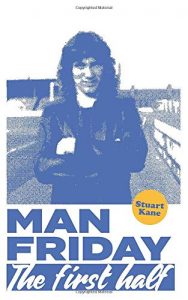 Stuart Kane is a novelist, researcher, and primary school teacher who was born in Birmingham. He had trials at Aston Villa as a youngster and was on the books at Walsall FC but wasn’t offered YTS forms. He then turned his focus to rugby where he played rugby league for Ireland Students in the mid-nineties.
Stuart Kane is a novelist, researcher, and primary school teacher who was born in Birmingham. He had trials at Aston Villa as a youngster and was on the books at Walsall FC but wasn’t offered YTS forms. He then turned his focus to rugby where he played rugby league for Ireland Students in the mid-nineties.
The soon to be released Man Friday: the second half, tells the story of cult football legend, Robin Friday, and his time at Reading and Cardiff City and kicks on from where his first football novel, Man Friday: the first half, finished. His academic interview with the author, Kevin Barry, appears in Conversations with Biographical Novelists: Truthful Fictions across the Globe and was published by Bloomsbury in 2019.
Stuart’s passion for football and biographical fiction combined to create Man Friday (The Life and Times of Robin Friday). ‘I wanted to bring Robin Friday back to life and tell his story more authentically. It had to be told from Robin’s point of view, not wanting to stray too far from the facts, and to try and find out what really happened to him during his life. He was an exceptionally complex character, and my books stay true to his spirit and character.’
Stuart was a Liverpool supporter as a lad citing his love of Ian Rush’s goalscoring exploits, then John Barnes’ sheer magic as the main reasons for this. A supporting nomad he’d often travel to watch local league sides such as Wolves, Birmingham City, Villa, Walsall, and non-league sides Sutton Coldfield Town and Solihull Moors. He then decided to support Aston Villa and has been following them ever since, which he describes as a rollercoaster. Stuart’s top ten football books, in no particular order, are:
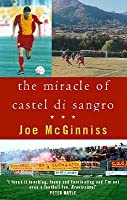 The Miracle of Castel di Sangro by Joe McGinniss (1999)
The Miracle of Castel di Sangro by Joe McGinniss (1999)
Well, we might as well start with a bit of controversy, so here’s the story of Castel di Sangro. The Italian minnows, who for a brief time, punched above their weight in Serie B. The author, Joe McGinniss, returned his one-million-dollar advance after refusing to write the OJ Simpson trial book. He called the OJ trial “an utter farce”. McGinniss fell in love with the beautiful game during the 1994 World Cup in the US. He said that he just wanted to be a sportswriter focussing on European football. McGinniss described this as therapy; it also helped him feel twenty years younger. McGinniss threw himself into Italian life, picking up the language, becoming friends with the players, fans, and coaches. The book is enthralling, and the drama that unfolds couldn’t be scripted. Fact is always stranger than fiction – to spin a cliché. I won’t give too much away here, but let’s just say McGinniss may well have been left to reflect on his OJ Simpson trial comments. It’s a dynamite book, and McGinniss’ passion shines through. He tries to stay objective but soon gets pulled into club politics and can’t stop himself from getting involved. At one point he falls out with the manager over the team selection, but that’s a relatively minor matter when compared to what later unfolds. You are pulled into this book by McGinniss’ superb writing, and he takes you on one hell of a ride.
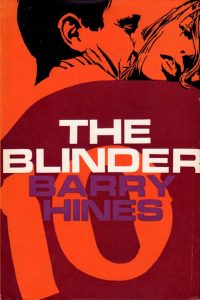 The Blinder by Barry Hines (1966)
The Blinder by Barry Hines (1966)
This was Barry Hines’ first novel, and it tells the story of Lenny Hawk, a brilliant young footballer. He is tough, talented, and trying to make a name for himself. Hawk is also a good college student and has an interest in his boss’ daughter, but he’s also got enemies who play for higher stakes. It’s a rich debut novel. Hines himself was both a good student and a tasty footballer. The author represented England Schoolboys, played for Barnsley’s reserves, and later, Loughborough University, Crawley Town, and Stocksbridge Works. We might assume then that there’s a lot of authentic experience behind the writing. The central character is a working-class lad with brains, who has his flaws. The dialogue is solid in this book, and that’s why I love it; it’s inspiring, and there is a rawness to it, but it’s all the richer for that. This is an often-overlooked classic, as Hines is more widely known for his novel, A Kestrel for a Knave (1968) – which became the classic film, Kes. Kestrel for a Knave contains, in my opinion, the most singularly perfect portrayal of a game of football on a school playing field in the English language. If you can get hold of an old copy of Blinder, I’d recommend it.
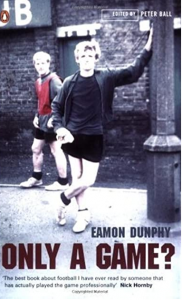 Only a Game? by Eamon Dunphy (1976)
Only a Game? by Eamon Dunphy (1976)
Eamon Dunphy, a marmite pundit, often mocked in his home country. He was a product of the excellent Stella Maris FC youth system. Then as a teenager, he moved to Manchester United but didn’t break through into the first team due to this being a golden age for United in terms of playing staff. Still, he went on to play for the Republic of Ireland and carved out a decent football career for himself. Towards the end of his time in the game, he started writing for a local paper in Reading while turning out for Reading FC. At Reading, he was drinking partner, friend, and guide to the one and only Robin Friday. Only a Game? tells the story of the 1973-74 season at Millwall through Dunphy’s personal diary – a form which has inspired many a football writer since. It records the events from the dressing-room and the struggles of being a professional footballer. Dunphy’s voice is clear, concise, and he captures the golden moments and failures with precision but more importantly, with emotion. This is a must-read if you have an interest in football books.
This book is pure and simple magic. It weaves the story of Ol’ Big’ Ead, or the one and only Brian Clough, or God as he’s known in some circles. The foreword is penned by José Mourinho, who freely admits his admiration and fondness for Clough. The book begins in January 1975 with Nottingham Forest sitting in thirteenth place in the old Second Division. They scrape promotion to the First Division, and that’s where the partnership of Clough and Taylor is rekindled. The personal reflections from the players help us understand how they were managed by Clough, and both his flaws and genius are on show for the reader. It is about the success of the team as a whole, as well as the Clough/Taylor partnership, and shows what can happen when all the parts pull together in the same direction. Nottingham Forest was a team full of characters: John Robertson, Martin O’Neill, John McGovern, Kenny Burns etc. The book allows these unique characters to tell their own stories and how they fared when pitted against the mighty Clough. Forest’s footballing feat will never be surpassed, or even equalled. Read the book, watch the accompanying DVD, laugh, cry, and go on this beautiful footballing joy ride.
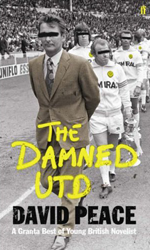 The Damned Utd by David Peace (2006)
The Damned Utd by David Peace (2006)
The book that inspired me to pen Man Friday. David Peace read all the different books that had been written about the Leeds United team from the 1970s. Many of the books were by the Leeds’ players or had been ghost-written for them. Peace found that there were many contradictions. This is of course, natural as people remember events differently, or simply wrongly. Peace’s vision was of a man filled with frustration and regret about his own playing career. Regrets about leaving Derby County, further bitterness at having joined Brighton & Hove Albion. A man who felt that he should have been the England manager. Then Clough, of course, had the feeling that people were conspiring against him at Leeds United. It’s a dark book in places, but there’s not too much doubt that Clough regretted taking on the role at Leeds. It was a bizarre move for Clough, who had constantly spoken out against Leeds United’s tough tactics. He’d also called out their master, Don Revie, on several occasions. It was only ever going to go one way. Peace’s use of the first and second person flows like a brook, and this is a masterclass in writing about football. The best football novel ever written.
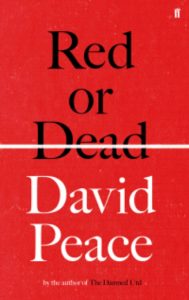 Red or Dead by David Peace (2013)
Red or Dead by David Peace (2013)
Peace’s epic biographical novel built around the footballing great, Bill Shankly. There are many levels to this book. It can be seen to represent the demise of the British working class, socialism and the trade unions, as well as being the antithesis of the footballing values of yesteryear versus modern-day football. We follow Shankly’s journey as he seeks to build Liverpool into a dominant force in domestic and European football. To get the voice of Shankly, Peace listened to the recordings of Shankly’s voice over, and over again. Peace borrowed the tapes from retired journalist John Roberts, what he noticed was Shankly’s use of repetitions, and he would go on to use these in the novel. The book’s themes can, at times, dominate proceedings, at the expense of the story. Still, it is a journey and builds up piece by piece as Shankly did with his mighty Liverpool.
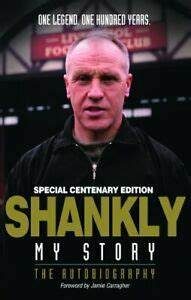 Shankly: My Story with John Roberts (1976)
Shankly: My Story with John Roberts (1976)
This book was written after Bill Shankly had left Liverpool and caused a lot of controversy at the time. Shankly spoke openly about his treatment by Liverpool, after his shock resignation in the summer of 1974. This book was ghost-written by John Roberts, a former journalist. Shankly said this book was ninety-nine per cent about people and one per cent criticism, but he said people had chosen to focus on that one per cent. Shankly claimed that he had just stated the facts. You can’t help but admire Shankly for what he did for that football club and the people of Liverpool. There are some great tales in this book, and we see humour, anger, frustration, but we see Shankly as he wanted to be seen and remembered. The book is testament to the foundations upon which Liverpool Football Club is built and which Jurgen Klopp continues to build on to this day. Shankly was a man for all seasons, but more importantly, he made the people happy.
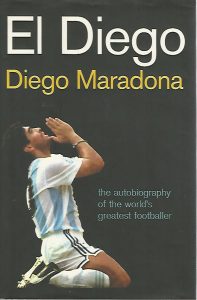 El Diego: the autobiography of the world’s greatest footballer with Marcelo Mora Y Araujo (2005)
El Diego: the autobiography of the world’s greatest footballer with Marcelo Mora Y Araujo (2005)
In this autobiography, we follow Diego Armando Maradona, or Maradona as he is known across the globe. To a whole nation, he is ‘El Pibe de Oro’ (The Golden Boy). This is Maradona in his own words. I read this book when it first came out, as, like most of us, I was fascinated by this footballing legend. A character who is capable of creating delight and frustration in equal amounts, and sometimes both in a single moment. As you’d expect Maradona shoots from the hip and doesn’t hold back. We relive some of Maradona’s greatest moments. We’re left feeling that he could’ve achieved even more as a player, were it not for his extra-curricular activities. Love or hate Maradona, he has that charm and charisma that carries you along and draws you to him. He was the greatest footballer that there’s ever been in my opinion. Maradona played at a time when defenders could still crush you with leg-breaking menace. He danced amongst defenders, fought with them, and beat them all. All of this while battling with his own demons and addictions. This book encapsulates Maradona’s character and spirit. If you’ve seen Asif Kapadia’s documentary Diego Maradona, you’ll enjoy this book, and if you’ve not seen that documentary, then please do.
 Angels with Dirty Faces: The Footballing History of Argentina by Jonathan Wilson (2016)
Angels with Dirty Faces: The Footballing History of Argentina by Jonathan Wilson (2016)
I have a love of Argentinian football and its history, from the national jersey to the greats of Batistuta, Di Stéfano, Kempes, Maradona, Messi etc. Wilson’s book delves deeply into the game but also talks about the socio-political and economic elements that have influenced Argentina and explores how these have impacted upon its football. Football runs through the blood of every Argentinian and as a writer of great detail, that can only come about through significant research, knowledge, and passion. Wilson tells us everything we need to know about football in this fascinating country. He doesn’t shy away from looking at the corruption that has plagued Argentinian football either – World Cup 1978 for a start. In fact, Wilson covers one of my favourite football mavericks the late, Tomás Felipe Carlovich. A player, arguably good enough to play for the national side but who decided to play for his local teams of Rosario and Central Córdoba instead. A home bird and footballing genius famous for his ‘double nutmeg’. José Pekerman chose Carlovich as the best central midfielder he’d ever seen. Maradona said Carlovich was better than him. Wilson’s book is a search for the soul of Argentinian football, and he doesn’t disappoint. Knowing how much effort and groundwork it takes to produce something this epic, I can only take my hat off to Jonathan Wilson and say thank you. An incredible book that is a must-read for those fascinated with Argentina, and it’s first love, football.
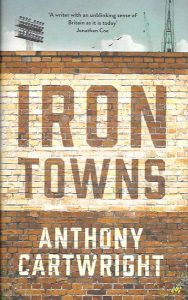 Iron Towns by Anthony Cartwright (2016)
Iron Towns by Anthony Cartwright (2016)
Anthony Cartwright takes on the difficult feat of producing a novel that is about football, but which is not about any known player or team. What Cartwright has crafted is a unique novel which shines a light on struggling football clubs in forgotten towns and the impact of industrial progress and the resulting fallout when dreams fall away. It follows Liam Corwen, journeyman defender, who returns back to his hometown club, after divorce, and a brief appearance in the Finnish league. Corwen, it tells us once played for England as a substitute, but according to everyone he never touched the ball. He knows that he did, in fact, touch it very lightly, with a header which sent the ball away from his opponents. This is a beautiful and subtle book which is layered and combines the sentimentality of football with a deeper exploration of both the changing face of the game and also the world in which the game exists. It is also about the function of clubs within their community and their importance, something which is now perhaps more prudent than ever.
